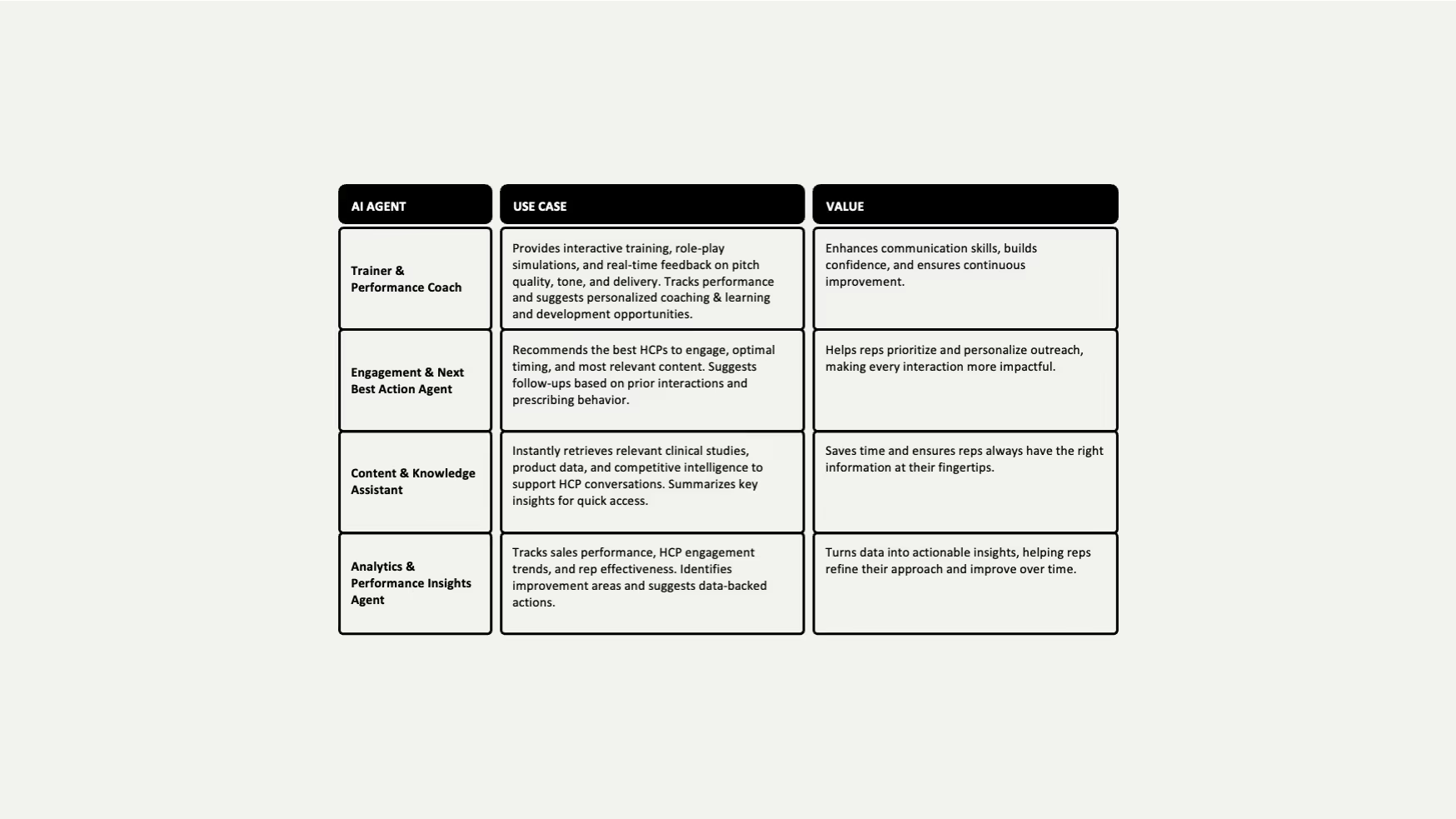Evolution of the Pharma Sales Representative
Evolution of the Pharma Sales Rep: From Field-Force Arms Race to AI-Augemented Engagement
Pharma sales is undergoing a major transformation. What began as a numbers game - more reps, more reach - is now a precision sport powered by data and AI. Discover how the role of the rep is evolving from high-touch to high-tech, and how AI agents are set to become the ultimate sales force multiplier.

In the pre-digital era, pharmaceutical companies largely competed by outspending each other on field force expansion. The strategy was simple: more reps meant more face-to-face HCP interactions, which meant more market share. This resulted in massive sales forces, particularly in blockbuster markets.
Take John, a top-performing rep in the early 2000s. His strategy? Persistence. He’d show up at an HCP’s office again and again, dropping off samples, taking notes, and memorizing every personal detail about the doctor.
- Smith’s kid played soccer? John made sure to ask about the last game.
- Patel preferred morning visits? John was there at 7:30 AM with coffee in hand.
John wasn’t alone. Thousands of reps were trained in the same high-touch, high-frequency approach.
But then, everything changed. Challenges with this strategy started to emerge:
- Diminishing Returns: An oversaturation of reps calling on the same HCPs led to message fatigue and reduced effectiveness
- Regulatory Restrictions: Governments & hospitals imposed stricter regulations and limited the number of rep-HCP interactions per year
- Shifting HCP Preferences: HCPs became more selective about how they engaged with reps, favouring data-driven, value-added interactions over frequent promotional visits
The old playbook no longer worked. Sales forces had to evolve.
In the pre-digital era, pharmaceutical companies largely competed by outspending each other on field force expansion. The strategy was simple: more reps meant more face-to-face HCP interactions, which meant more market share. This resulted in massive sales forces, particularly in blockbuster markets.
Take John, a top-performing rep in the early 2000s. His strategy? Persistence. He’d show up at an HCP’s office again and again, dropping off samples, taking notes, and memorizing every personal detail about the doctor.
- Smith’s kid played soccer? John made sure to ask about the last game.
- Patel preferred morning visits? John was there at 7:30 AM with coffee in hand.
John wasn’t alone. Thousands of reps were trained in the same high-touch, high-frequency approach.
But then, everything changed. Challenges with this strategy started to emerge:
- Diminishing Returns: An oversaturation of reps calling on the same HCPs led to message fatigue and reduced effectiveness
- Regulatory Restrictions: Governments & hospitals imposed stricter regulations and limited the number of rep-HCP interactions per year
- Shifting HCP Preferences: HCPs became more selective about how they engaged with reps, favouring data-driven, value-added interactions over frequent promotional visits
The old playbook no longer worked. Sales forces had to evolve.
In the pre-digital era, pharmaceutical companies largely competed by outspending each other on field force expansion. The strategy was simple: more reps meant more face-to-face HCP interactions, which meant more market share. This resulted in massive sales forces, particularly in blockbuster markets.
Take John, a top-performing rep in the early 2000s. His strategy? Persistence. He’d show up at an HCP’s office again and again, dropping off samples, taking notes, and memorizing every personal detail about the doctor.
- Smith’s kid played soccer? John made sure to ask about the last game.
- Patel preferred morning visits? John was there at 7:30 AM with coffee in hand.
John wasn’t alone. Thousands of reps were trained in the same high-touch, high-frequency approach.
But then, everything changed. Challenges with this strategy started to emerge:
- Diminishing Returns: An oversaturation of reps calling on the same HCPs led to message fatigue and reduced effectiveness
- Regulatory Restrictions: Governments & hospitals imposed stricter regulations and limited the number of rep-HCP interactions per year
- Shifting HCP Preferences: HCPs became more selective about how they engaged with reps, favouring data-driven, value-added interactions over frequent promotional visits
The old playbook no longer worked. Sales forces had to evolve.
The Sales Force Arms Race (1980s-2000s): More Reps, More Market Share
In the pre-digital era, pharmaceutical companies largely competed by outspending each other on field force expansion. The strategy was simple: more reps meant more face-to-face HCP interactions, which meant more market share. This resulted in massive sales forces, particularly in blockbuster markets.
Take John, a top-performing rep in the early 2000s. His strategy? Persistence. He’d show up at an HCP’s office again and again, dropping off samples, taking notes, and memorizing every personal detail about the doctor.
- Smith’s kid played soccer? John made sure to ask about the last game.
- Patel preferred morning visits? John was there at 7:30 AM with coffee in hand.
John wasn’t alone. Thousands of reps were trained in the same high-touch, high-frequency approach.
But then, everything changed. Challenges with this strategy started to emerge:
- Diminishing Returns: An oversaturation of reps calling on the same HCPs led to message fatigue and reduced effectiveness
- Regulatory Restrictions: Governments & hospitals imposed stricter regulations and limited the number of rep-HCP interactions per year
- Shifting HCP Preferences: HCPs became more selective about how they engaged with reps, favouring data-driven, value-added interactions over frequent promotional visits
The old playbook no longer worked. Sales forces had to evolve.
The Sales Force Arms Race (1980s-2000s): More Reps, More Market Share
In the pre-digital era, pharmaceutical companies largely competed by outspending each other on field force expansion. The strategy was simple: more reps meant more face-to-face HCP interactions, which meant more market share. This resulted in massive sales forces, particularly in blockbuster markets.
Take John, a top-performing rep in the early 2000s. His strategy? Persistence. He’d show up at an HCP’s office again and again, dropping off samples, taking notes, and memorizing every personal detail about the doctor.
- Smith’s kid played soccer? John made sure to ask about the last game.
- Patel preferred morning visits? John was there at 7:30 AM with coffee in hand.
John wasn’t alone. Thousands of reps were trained in the same high-touch, high-frequency approach.
But then, everything changed. Challenges with this strategy started to emerge:
- Diminishing Returns: An oversaturation of reps calling on the same HCPs led to message fatigue and reduced effectiveness
- Regulatory Restrictions: Governments & hospitals imposed stricter regulations and limited the number of rep-HCP interactions per year
- Shifting HCP Preferences: HCPs became more selective about how they engaged with reps, favouring data-driven, value-added interactions over frequent promotional visits
The old playbook no longer worked. Sales forces had to evolve.

The Sales Force Arms Race (1980s-2000s): More Reps, More Market Share
As pharma moved from brute-force selling to data-driven engagement, reps like John shifted from persistence to precision. CRM systems helped track HCP preferences, ensuring timely, relevant interactions. Generic pitches gave way to personalized, data-informed conversations. HCPs embraced a hybrid model, preferring fewer, high-value in-person visits, alongside digital touchpoints like webinars and web portals.
The rep’s role evolved into a trusted consultant, requiring:
- Cross-functional collaboration, and co-creation with hospital systems, payers, advocacy groups, and digital health partners.
- Deeper clinical and data fluency to provide value beyond promotion.
- Mastery of digital tools and becoming a consumer of data and analytics insights to enhance engagement and optimize performance.
Reps who thrived weren’t just great communicators, they became data-driven, tech-enabled problem-solvers. And now, AI is taking the importance of these skills to the next level.
As pharma moved from brute-force selling to data-driven engagement, reps like John shifted from persistence to precision. CRM systems helped track HCP preferences, ensuring timely, relevant interactions. Generic pitches gave way to personalized, data-informed conversations. HCPs embraced a hybrid model, preferring fewer, high-value in-person visits, alongside digital touchpoints like webinars and web portals.
The rep’s role evolved into a trusted consultant, requiring:
- Cross-functional collaboration, and co-creation with hospital systems, payers, advocacy groups, and digital health partners.
- Deeper clinical and data fluency to provide value beyond promotion.
- Mastery of digital tools and becoming a consumer of data and analytics insights to enhance engagement and optimize performance.
Reps who thrived weren’t just great communicators, they became data-driven, tech-enabled problem-solvers. And now, AI is taking the importance of these skills to the next level.
As pharma moved from brute-force selling to data-driven engagement, reps like John shifted from persistence to precision. CRM systems helped track HCP preferences, ensuring timely, relevant interactions. Generic pitches gave way to personalized, data-informed conversations. HCPs embraced a hybrid model, preferring fewer, high-value in-person visits, alongside digital touchpoints like webinars and web portals.
The rep’s role evolved into a trusted consultant, requiring:
- Cross-functional collaboration, and co-creation with hospital systems, payers, advocacy groups, and digital health partners.
- Deeper clinical and data fluency to provide value beyond promotion.
- Mastery of digital tools and becoming a consumer of data and analytics insights to enhance engagement and optimize performance.
Reps who thrived weren’t just great communicators, they became data-driven, tech-enabled problem-solvers. And now, AI is taking the importance of these skills to the next level.
The Digital Shift (2010s-Present): Data & Digital Driven Engagement
As pharma moved from brute-force selling to data-driven engagement, reps like John shifted from persistence to precision. CRM systems helped track HCP preferences, ensuring timely, relevant interactions. Generic pitches gave way to personalized, data-informed conversations. HCPs embraced a hybrid model, preferring fewer, high-value in-person visits, alongside digital touchpoints like webinars and web portals.
The rep’s role evolved into a trusted consultant, requiring:
- Cross-functional collaboration, and co-creation with hospital systems, payers, advocacy groups, and digital health partners.
- Deeper clinical and data fluency to provide value beyond promotion.
- Mastery of digital tools and becoming a consumer of data and analytics insights to enhance engagement and optimize performance.
Reps who thrived weren’t just great communicators, they became data-driven, tech-enabled problem-solvers. And now, AI is taking the importance of these skills to the next level.
The Digital Shift (2010s-Present): Data & Digital Driven Engagement
As pharma moved from brute-force selling to data-driven engagement, reps like John shifted from persistence to precision. CRM systems helped track HCP preferences, ensuring timely, relevant interactions. Generic pitches gave way to personalized, data-informed conversations. HCPs embraced a hybrid model, preferring fewer, high-value in-person visits, alongside digital touchpoints like webinars and web portals.
The rep’s role evolved into a trusted consultant, requiring:
- Cross-functional collaboration, and co-creation with hospital systems, payers, advocacy groups, and digital health partners.
- Deeper clinical and data fluency to provide value beyond promotion.
- Mastery of digital tools and becoming a consumer of data and analytics insights to enhance engagement and optimize performance.
Reps who thrived weren’t just great communicators, they became data-driven, tech-enabled problem-solvers. And now, AI is taking the importance of these skills to the next level.

The Digital Shift (2010s-Present): Data & Digital Driven Engagement
Fast forward to today. A new transformation is underway. But this time, it’s not about hiring more human reps. It’s about making every rep exponentially more effective, by supplementing the field force with AI Agents.
Imagine a future where John has a team of AI agents supporting him. These Agents support John in all his key decisions and tasks, and even coach him so that he can improve his performance.


Fast forward to today. A new transformation is underway. But this time, it’s not about hiring more human reps. It’s about making every rep exponentially more effective, by supplementing the field force with AI Agents.
Imagine a future where John has a team of AI agents supporting him. These Agents support John in all his key decisions and tasks, and even coach him so that he can improve his performance.
Fast forward to today. A new transformation is underway. But this time, it’s not about hiring more human reps. It’s about making every rep exponentially more effective, by supplementing the field force with AI Agents.
Imagine a future where John has a team of AI agents supporting him. These Agents support John in all his key decisions and tasks, and even coach him so that he can improve his performance.
The AI-Powered Rep: Agentic AI as a Sales Force Multiplier
Fast forward to today. A new transformation is underway. But this time, it’s not about hiring more human reps. It’s about making every rep exponentially more effective, by supplementing the field force with AI Agents.
Imagine a future where John has a team of AI agents supporting him. These Agents support John in all his key decisions and tasks, and even coach him so that he can improve his performance.
The AI-Powered Rep: Agentic AI as a Sales Force Multiplier
Fast forward to today. A new transformation is underway. But this time, it’s not about hiring more human reps. It’s about making every rep exponentially more effective, by supplementing the field force with AI Agents.
Imagine a future where John has a team of AI agents supporting him. These Agents support John in all his key decisions and tasks, and even coach him so that he can improve his performance.

The AI-Powered Rep: Agentic AI as a Sales Force Multiplier
AI agents to support the sales rep have broad applicability across various markets and disease areas, but there are some spaces where investment in agents is incredibly compelling as a competitive differentiator.
Take for instance Multiple Myeloma, a disease area with a complex treatment landscape, and a lack of standardized treatment algorithm. Physicians must navigate multiple on-market and pipeline drug classes (e.g. monoclonal antibodies, bispecifics, proteasome inhibitors, IMiDs, cell therapies, etc..), each with distinct mechanisms, combinations, and sequencing challenges.
Companies are fighting with each other and paying well over market rate to recruit experienced reps to support their product launches – because they know that expertise and experience in Multiple Myeloma will be critical to commercial success.
Reps must master the science, anticipate objections, and tailor messaging – which requires deep disease and product data knowledge and precise, personalized execution, which is where AI-powered agents can make all the difference.
Now, imagine equipping your Multiple Myeloma field force with AI-driven tools that enhance their knowledge, improve HCP targeting, and optimize customer engagement. These agents can help reps confidently navigate complexity, stay ahead of competitors, and deliver high-impact interactions to drive commercial success.


AI agents to support the sales rep have broad applicability across various markets and disease areas, but there are some spaces where investment in agents is incredibly compelling as a competitive differentiator.
Take for instance Multiple Myeloma, a disease area with a complex treatment landscape, and a lack of standardized treatment algorithm. Physicians must navigate multiple on-market and pipeline drug classes (e.g. monoclonal antibodies, bispecifics, proteasome inhibitors, IMiDs, cell therapies, etc..), each with distinct mechanisms, combinations, and sequencing challenges.
Companies are fighting with each other and paying well over market rate to recruit experienced reps to support their product launches – because they know that expertise and experience in Multiple Myeloma will be critical to commercial success.
Reps must master the science, anticipate objections, and tailor messaging – which requires deep disease and product data knowledge and precise, personalized execution, which is where AI-powered agents can make all the difference.
Now, imagine equipping your Multiple Myeloma field force with AI-driven tools that enhance their knowledge, improve HCP targeting, and optimize customer engagement. These agents can help reps confidently navigate complexity, stay ahead of competitors, and deliver high-impact interactions to drive commercial success.
AI agents to support the sales rep have broad applicability across various markets and disease areas, but there are some spaces where investment in agents is incredibly compelling as a competitive differentiator.
Take for instance Multiple Myeloma, a disease area with a complex treatment landscape, and a lack of standardized treatment algorithm. Physicians must navigate multiple on-market and pipeline drug classes (e.g. monoclonal antibodies, bispecifics, proteasome inhibitors, IMiDs, cell therapies, etc..), each with distinct mechanisms, combinations, and sequencing challenges.
Companies are fighting with each other and paying well over market rate to recruit experienced reps to support their product launches – because they know that expertise and experience in Multiple Myeloma will be critical to commercial success.
Reps must master the science, anticipate objections, and tailor messaging – which requires deep disease and product data knowledge and precise, personalized execution, which is where AI-powered agents can make all the difference.
Now, imagine equipping your Multiple Myeloma field force with AI-driven tools that enhance their knowledge, improve HCP targeting, and optimize customer engagement. These agents can help reps confidently navigate complexity, stay ahead of competitors, and deliver high-impact interactions to drive commercial success.
AI Agents: Your Competitive Differentiator
AI agents to support the sales rep have broad applicability across various markets and disease areas, but there are some spaces where investment in agents is incredibly compelling as a competitive differentiator.
Take for instance Multiple Myeloma, a disease area with a complex treatment landscape, and a lack of standardized treatment algorithm. Physicians must navigate multiple on-market and pipeline drug classes (e.g. monoclonal antibodies, bispecifics, proteasome inhibitors, IMiDs, cell therapies, etc..), each with distinct mechanisms, combinations, and sequencing challenges.
Companies are fighting with each other and paying well over market rate to recruit experienced reps to support their product launches – because they know that expertise and experience in Multiple Myeloma will be critical to commercial success.
Reps must master the science, anticipate objections, and tailor messaging – which requires deep disease and product data knowledge and precise, personalized execution, which is where AI-powered agents can make all the difference.
Now, imagine equipping your Multiple Myeloma field force with AI-driven tools that enhance their knowledge, improve HCP targeting, and optimize customer engagement. These agents can help reps confidently navigate complexity, stay ahead of competitors, and deliver high-impact interactions to drive commercial success.
AI Agents: Your Competitive Differentiator
AI agents to support the sales rep have broad applicability across various markets and disease areas, but there are some spaces where investment in agents is incredibly compelling as a competitive differentiator.
Take for instance Multiple Myeloma, a disease area with a complex treatment landscape, and a lack of standardized treatment algorithm. Physicians must navigate multiple on-market and pipeline drug classes (e.g. monoclonal antibodies, bispecifics, proteasome inhibitors, IMiDs, cell therapies, etc..), each with distinct mechanisms, combinations, and sequencing challenges.
Companies are fighting with each other and paying well over market rate to recruit experienced reps to support their product launches – because they know that expertise and experience in Multiple Myeloma will be critical to commercial success.
Reps must master the science, anticipate objections, and tailor messaging – which requires deep disease and product data knowledge and precise, personalized execution, which is where AI-powered agents can make all the difference.
Now, imagine equipping your Multiple Myeloma field force with AI-driven tools that enhance their knowledge, improve HCP targeting, and optimize customer engagement. These agents can help reps confidently navigate complexity, stay ahead of competitors, and deliver high-impact interactions to drive commercial success.

AI Agents: Your Competitive Differentiator
Sales reps won’t be replaced by AI, but those who embrace AI will outperform those who don’t.
Imagine a resurgence of the Sales Force Arms Race (1980s-2000s), but this time, instead of purely expanding human headcount, a significant portion of the “field force” is made up of AI-powered agents augmenting rep capabilities.
To thrive in this new landscape, human reps must be equipped with the right tools, training, and AI-driven insights. While AI can enhance efficiency, optimize engagement, and provide coaching and training, it cannot replace the fundamental strengths of a great rep; building relationships, earning trust, and solving complex problems.
The future isn’t about AI vs. reps. It’s about AI-empowered reps leading the way.
Sales reps won’t be replaced by AI, but those who embrace AI will outperform those who don’t.
Imagine a resurgence of the Sales Force Arms Race (1980s-2000s), but this time, instead of purely expanding human headcount, a significant portion of the “field force” is made up of AI-powered agents augmenting rep capabilities.
To thrive in this new landscape, human reps must be equipped with the right tools, training, and AI-driven insights. While AI can enhance efficiency, optimize engagement, and provide coaching and training, it cannot replace the fundamental strengths of a great rep; building relationships, earning trust, and solving complex problems.
The future isn’t about AI vs. reps. It’s about AI-empowered reps leading the way.
Sales reps won’t be replaced by AI, but those who embrace AI will outperform those who don’t.
Imagine a resurgence of the Sales Force Arms Race (1980s-2000s), but this time, instead of purely expanding human headcount, a significant portion of the “field force” is made up of AI-powered agents augmenting rep capabilities.
To thrive in this new landscape, human reps must be equipped with the right tools, training, and AI-driven insights. While AI can enhance efficiency, optimize engagement, and provide coaching and training, it cannot replace the fundamental strengths of a great rep; building relationships, earning trust, and solving complex problems.
The future isn’t about AI vs. reps. It’s about AI-empowered reps leading the way.
AI as a Force Multiplier, Not a Replacement
Sales reps won’t be replaced by AI, but those who embrace AI will outperform those who don’t.
Imagine a resurgence of the Sales Force Arms Race (1980s-2000s), but this time, instead of purely expanding human headcount, a significant portion of the “field force” is made up of AI-powered agents augmenting rep capabilities.
To thrive in this new landscape, human reps must be equipped with the right tools, training, and AI-driven insights. While AI can enhance efficiency, optimize engagement, and provide coaching and training, it cannot replace the fundamental strengths of a great rep; building relationships, earning trust, and solving complex problems.
The future isn’t about AI vs. reps. It’s about AI-empowered reps leading the way.
AI as a Force Multiplier, Not a Replacement
Sales reps won’t be replaced by AI, but those who embrace AI will outperform those who don’t.
Imagine a resurgence of the Sales Force Arms Race (1980s-2000s), but this time, instead of purely expanding human headcount, a significant portion of the “field force” is made up of AI-powered agents augmenting rep capabilities.
To thrive in this new landscape, human reps must be equipped with the right tools, training, and AI-driven insights. While AI can enhance efficiency, optimize engagement, and provide coaching and training, it cannot replace the fundamental strengths of a great rep; building relationships, earning trust, and solving complex problems.
The future isn’t about AI vs. reps. It’s about AI-empowered reps leading the way.

AI as a Force Multiplier, Not a Replacement
At Intellishore, we specialize in AI strategy, solution design, and implementation, helping organizations navigate the transition to AI-driven transformation. Our expertise extends beyond technology. We also support change management, ensuring seamless adoption and maximum solution impact.
We deploy AI that delivers results – fast. With proven AI accelerators, we quickly tailor solutions to fit your business, ensuring rapid impact with minimal disruption.
AI is already reshaping sales and those who act now will lead the future. If you want to gain a competitive edge, reach out for a demo! We would love to discuss how we can help you get ahead.
At Intellishore, we specialize in AI strategy, solution design, and implementation, helping organizations navigate the transition to AI-driven transformation. Our expertise extends beyond technology. We also support change management, ensuring seamless adoption and maximum solution impact.
We deploy AI that delivers results – fast. With proven AI accelerators, we quickly tailor solutions to fit your business, ensuring rapid impact with minimal disruption.
AI is already reshaping sales and those who act now will lead the future. If you want to gain a competitive edge, reach out for a demo! We would love to discuss how we can help you get ahead.
At Intellishore, we specialize in AI strategy, solution design, and implementation, helping organizations navigate the transition to AI-driven transformation. Our expertise extends beyond technology. We also support change management, ensuring seamless adoption and maximum solution impact.
We deploy AI that delivers results – fast. With proven AI accelerators, we quickly tailor solutions to fit your business, ensuring rapid impact with minimal disruption.
AI is already reshaping sales and those who act now will lead the future. If you want to gain a competitive edge, reach out for a demo! We would love to discuss how we can help you get ahead.
The Next Step
At Intellishore, we specialize in AI strategy, solution design, and implementation, helping organizations navigate the transition to AI-driven transformation. Our expertise extends beyond technology. We also support change management, ensuring seamless adoption and maximum solution impact.
We deploy AI that delivers results – fast. With proven AI accelerators, we quickly tailor solutions to fit your business, ensuring rapid impact with minimal disruption.
AI is already reshaping sales and those who act now will lead the future. If you want to gain a competitive edge, reach out for a demo! We would love to discuss how we can help you get ahead.
The Next Step
At Intellishore, we specialize in AI strategy, solution design, and implementation, helping organizations navigate the transition to AI-driven transformation. Our expertise extends beyond technology. We also support change management, ensuring seamless adoption and maximum solution impact.
We deploy AI that delivers results – fast. With proven AI accelerators, we quickly tailor solutions to fit your business, ensuring rapid impact with minimal disruption.
AI is already reshaping sales and those who act now will lead the future. If you want to gain a competitive edge, reach out for a demo! We would love to discuss how we can help you get ahead.

The Next Step


Clinical Decision Support tools are set to transform patient care - from tackling information overload and HCP shortages to enabling personalized, preventative healthcare. In this whitepaper, we explore how pharma and medtech can design, scale, and embed CDS solutions that create real clinical and commercial value. Sign up to receive the full whitepaper and get practical guidance for shaping the future of care.
.avif)
Interested in exploring how these insights apply to your context?
Feel free to reach out for a deeper discussion.
In this article we give our point of view on how healthcare organizations can design a scalable content engine with local flexibility for impactful customer engagement - and how to succeed where other organizations typically fail.
Click to read more
In this perspective on Build vs Buy in AI, we share how to move beyond a buy-only mindset by designing AI around your processes and competitive edge. We explore why off-the-shelf works well in domains where correctness and compliance matter most, why you need more ownership in use cases that drive differentiation, and how a hybrid approach - buying the base and building the system around it - keeps operations stable while still enabling you to stand out.
Click to read more
In this four-part series, “Mastering CX in Pharma”, we aim to share our perspective and approaches on how to succeed in designing a winning customer experience. We will deep dive into engagement model design, data as a key enabler, how to design an operating model that supports your strategic ambitions, and the role of change management.
Click to read more
In this four-part series, “Mastering CX in Pharma”, we aim to share our perspective and approaches on how to succeed in designing a winning customer experience. We will deep dive into engagement model design, data as a key enabler, how to design an operating model that supports your strategic ambitions, and the role of change management.
Click to read more


